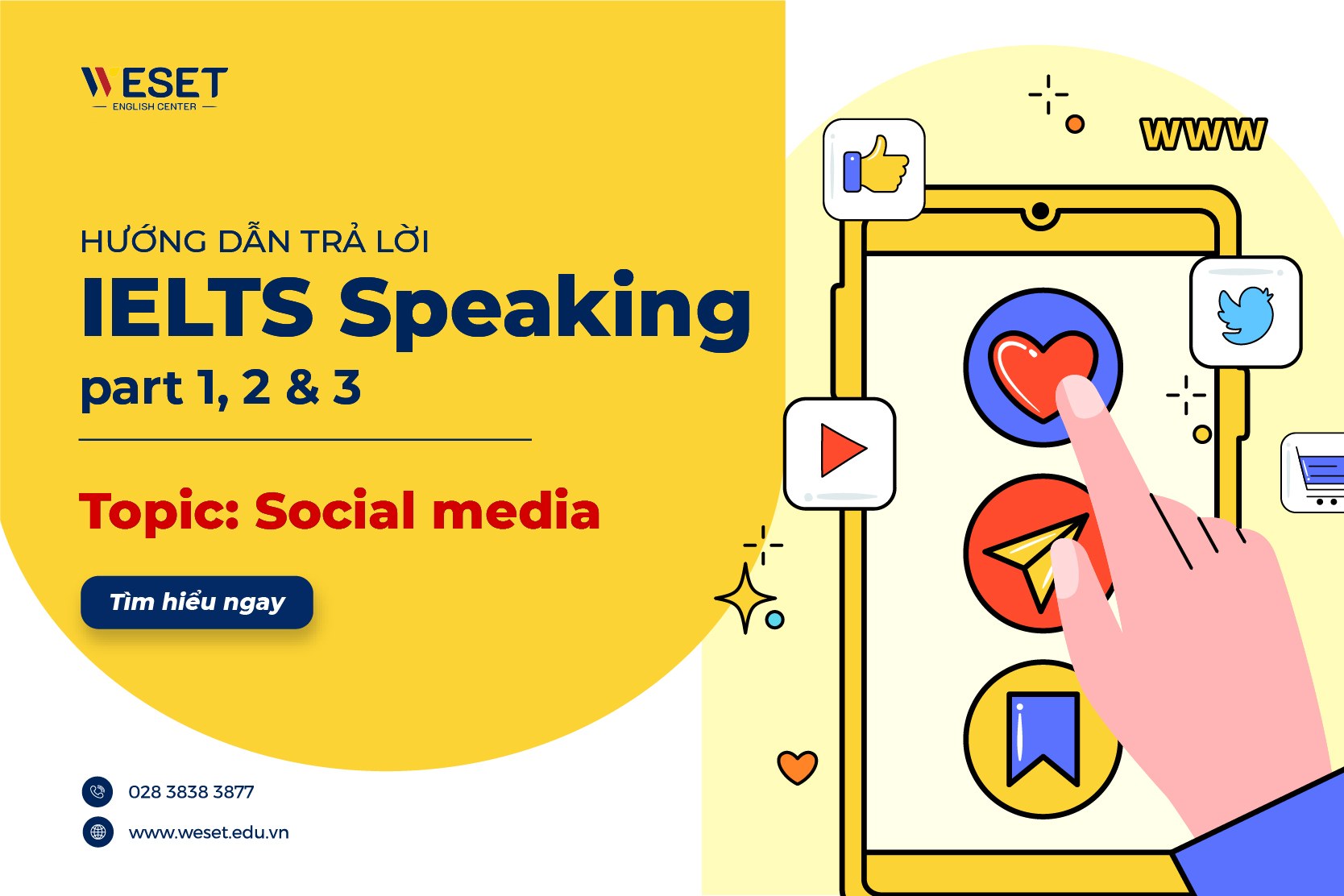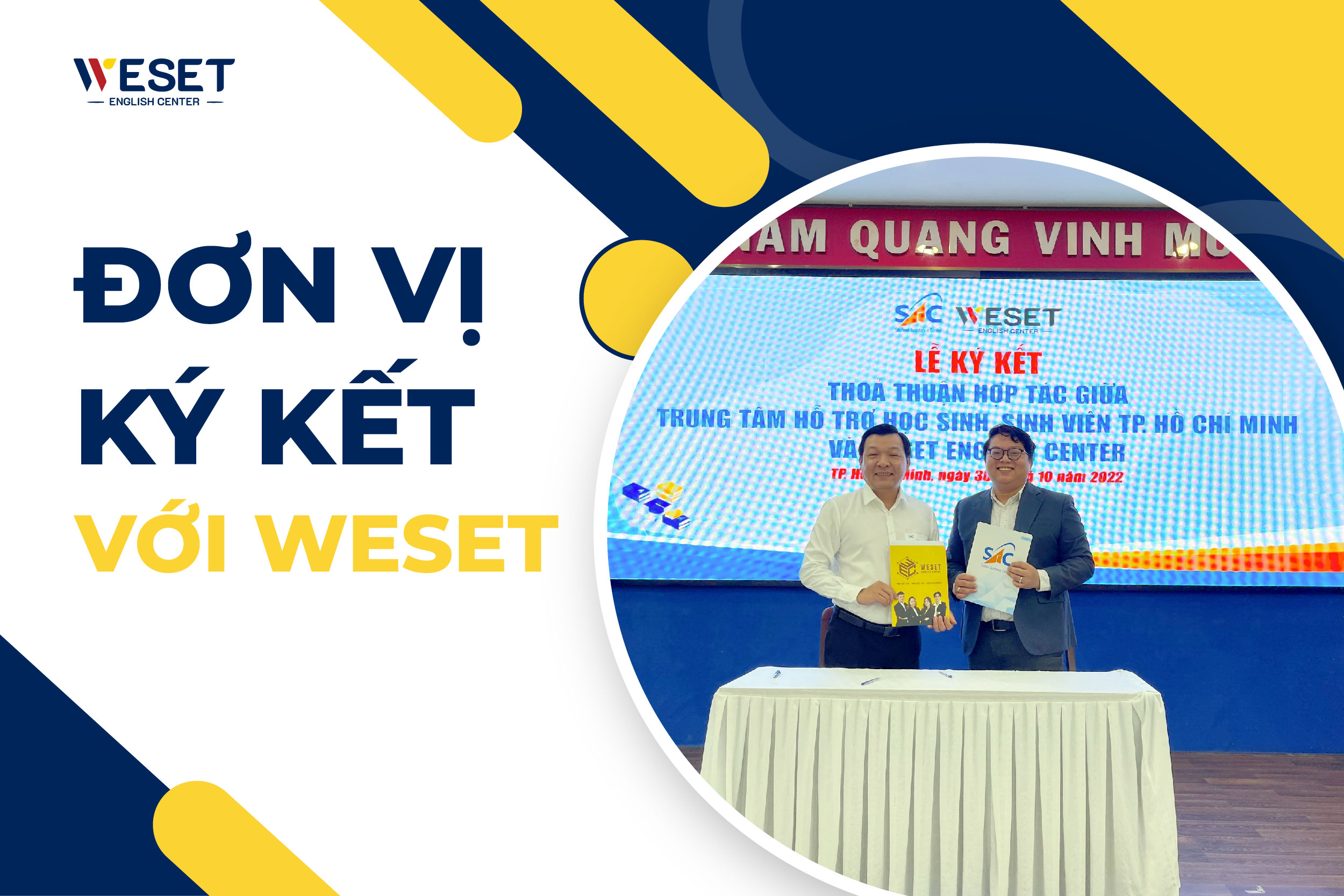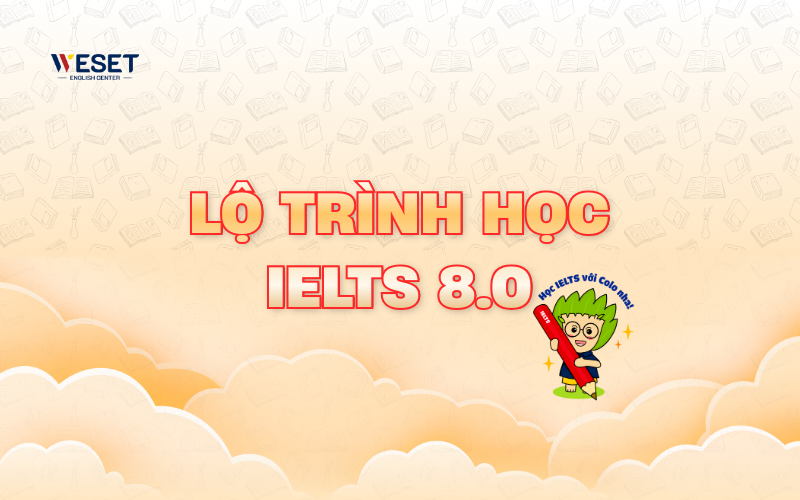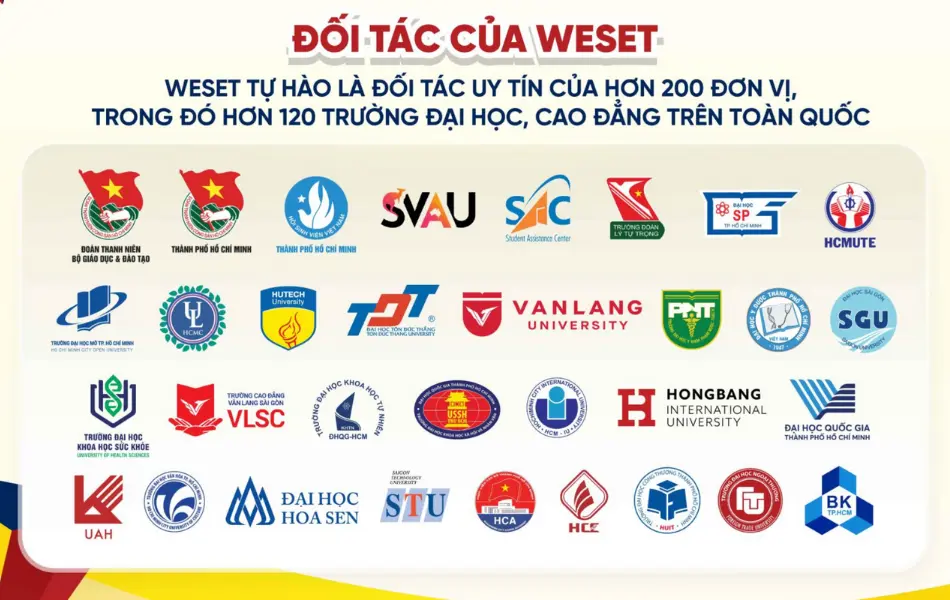Trang chủ Blog Bài thi IELTS mẫu Social Media IELTS Speaking – Sample Part 1, 2 & 3
Social Media IELTS Speaking – Sample Part 1, 2 & 3
- Jonathan M. Pham
- Bài mẫu IELTS Sample Speaking, Bài thi IELTS mẫu
MỤC LỤC
Hôm nay, đến với series bài mẫu theo các chủ đề Speaking thông dụng, hãy cùng WESET tìm hiểu topic Social Media IELTS Speaking – bao gồm cách trả lời mẫu cho 3 part phần thi nói và từ vựng chủ đề Mạng xã hội bạn nhé!
Social Media IELTS Speaking – Part 1
Q1: Do you use social media? Why or why not?
A1: Yes, I do use social media. It has become an integral part of modern life, allowing me to stay connected with friends and family who are far away. Moreover, social media provides a platform to share and explore various ideas and perspectives, which I find enriching and informative.
Q2: Which social media platform do you use the most? Why?
A2: I use Instagram the most. It’s a visually engaging platform that allows me to share my experiences through photos and videos. Additionally, I enjoy following various accounts related to my interests, such as travel, photography, and cooking, which keeps me inspired and entertained.
Q3: What kind of information do you usually share on your social media profiles?
A3: On my social media profiles, I mostly share my travel experiences, special moments with friends and family, and occasionally some of my creative pursuits. I prefer to share positive and inspiring content, as I believe it can have a beneficial impact on my followers.
Q4: Is social media becoming more important in your country? Why?
A4: Absolutely! Social media is gaining increasing importance in my country. With the rapid growth of internet connectivity and smartphone usage, more people are joining social media platforms to stay informed, share opinions, and connect with others. It has also become a crucial platform for businesses and influencers to reach their target audience.
Q5: Do you think social media has more positive or negative effects on society?
A5: Social media has both positive and negative effects on society. On the positive side, it fosters global connectivity, facilitates communication, and promotes awareness about social issues. However, it also has negative aspects like cyberbullying, misinformation, and addiction to excessive screen time. It’s essential for users to be mindful of their online behavior and usage to maximize the positive impact of social media.
Q6: How do you deal with negative experiences or comments on social media?
A6: If I encounter negative experiences or comments on social media, I try to remain calm and not engage in heated debates. I believe in the power of positive dialogue and focus on understanding others’ perspectives. If the situation becomes too unpleasant, I don’t hesitate to use the block or mute features to maintain a healthy online environment.
Social Media IELTS Speaking – Part 2
Question: Describe a positive impact of social media on society. You should say:
- What specific positive impact it has.
- How it benefits individuals or communities.
- Any real-life examples that illustrate this impact, and
- Your personal views on the significance of this impact.
Answer:
Social media has undeniably brought about numerous positive impacts on society, and one significant example of this is its role in promoting social awareness and philanthropy.
Firstly, social media serves as a powerful platform to raise awareness about various social issues. It allows individuals and organizations to reach a vast audience, enabling them to share valuable information about causes such as climate change, poverty alleviation, and mental health awareness.
This benefit directly benefits individuals and communities by mobilizing support and resources. For instance, crowdfunding campaigns on social media have proven instrumental in helping individuals in need access medical treatment, education, and other essentials. Communities can rally together to support marginalized groups and amplify their voices, leading to positive changes at a grassroots level.
A real-life example of this impact is the Ice Bucket Challenge that went viral on social media a few years ago. The challenge aimed to raise awareness and funds for amyotrophic lateral sclerosis (ALS) research. As a result of this social media phenomenon, millions of dollars were raised for ALS research, significantly advancing the understanding and treatment of the disease.
In my opinion, this positive impact of social media is of immense significance. By leveraging the reach and engagement of social platforms, we can create a more empathetic and compassionate society. The ability to unite people from different backgrounds and cultures for a shared cause demonstrates the potential of social media as a force for good in the world.
Overall, the positive impact of social media in promoting social awareness and philanthropy showcases its immense potential to drive positive change and make the world a better place.
Social Media IELTS Speaking – Part 3
Q1: How has social media affected the way people communicate with each other?
A1: Social media has revolutionized the way people communicate with each other. It has made communication faster and more convenient, allowing individuals to connect with friends, family, and acquaintances regardless of geographical barriers. People can share their thoughts, experiences, and emotions in real-time through posts, messages, and video calls, enhancing interpersonal relationships and maintaining constant contact with loved ones.
Q2: Some argue that social media has led to a decline in face-to-face communication. What are your views on this?
A2: While it is true that social media has changed the dynamics of communication, I believe it doesn’t necessarily lead to a decline in face-to-face interactions. Instead, it offers an additional channel for communication. People now have the flexibility to communicate in various ways, depending on their preferences and circumstances. However, it is essential to strike a balance and not completely replace real-life interactions with virtual ones to maintain the richness of interpersonal connections.
Q3: Social media platforms often collect users’ data to personalize their online experiences. Do you think this is a privacy concern?
A3: Yes, the collection of users’ data by social media platforms does raise privacy concerns. While personalized experiences can be helpful in curating content that aligns with users’ interests, it also means that companies have access to vast amounts of personal information. This data could potentially be misused or shared without users’ consent. It’s crucial for users to be aware of the privacy policies of the platforms they use and take appropriate measures to protect their data.
Q4: How does social media influence people’s buying behavior?
A4: Social media has a significant impact on people’s buying behavior. Through targeted advertisements and influencer marketing, social media platforms have become powerful tools for brands to reach their target audience. People often come across products and services that align with their interests and preferences, which can influence their purchasing decisions. Moreover, user reviews and recommendations on social media play a crucial role in shaping consumers’ perceptions and choices.
Q5: In what ways can social media be used to promote positive social change?
A5: Social media has immense potential to promote positive social change. It can be utilized to raise awareness about social issues, advocate for human rights, and mobilize communities for charitable causes. Grassroots movements gain momentum through social media, allowing like-minded individuals to unite and voice their concerns on a global scale. Additionally, social media enables transparency and accountability, holding governments and organizations responsible for their actions.
Q6: What are the potential drawbacks of social media in terms of mental health?
A6: Social media can have adverse effects on mental health if not used responsibly. The constant exposure to curated and idealized lives on social platforms may lead to feelings of inadequacy and comparison. Moreover, excessive use of social media can lead to addiction and disrupt sleep patterns, impacting overall well-being. It is essential for users to be mindful of their usage and take breaks from social media to maintain a healthy balance between the virtual world and real-life interactions.
Từ vựng Social Media IELTS Speaking
| English | Vietnamese |
|---|---|
| Social media | Mạng xã hội |
| Platform | Nền tảng |
| Share | Chia sẻ |
| Connect | Kết nối |
| Engage | Tương tác |
| Interaction | Tương tác |
| Online presence | Hiện diện trực tuyến |
| Content | Nội dung |
| Post | Đăng bài |
| Comment | Bình luận |
| Like | Thích |
| Follow | Theo dõi |
| Friend | Bạn bè |
| Follower | Người theo dõi |
| Trend | Xu hướng |
| Viral | Lan truyền |
| Privacy | Quyền riêng tư |
| Data | Dữ liệu |
| Online behavior | Hành vi trực tuyến |
| Influencer | Người có ảnh hưởng |
| Advertisement | Quảng cáo |
| Target audience | Đối tượng mục tiêu |
| Awareness | Nhận thức |
| Advocacy | Ủng hộ |
| Transparency | Tính minh bạch |
| Accountability | Trách nhiệm, chịu trách nhiệm |
| Addiction | Nghiện |
| Mental health | Sức khỏe tâm thần |
| Well-being | Sự khỏe mạnh |
| Face-to-face | Trực tiếp |
| Real-life interactions | Giao tiếp trực tiếp trong cuộc sống hàng ngày |
| Grassroots movement | Phong trào cơ sở |
| Idealized lives | Cuộc sống hoàn hảo hóa |
Lời kết
Trên đây là tổng hợp bài mẫu theo chủ đề Social Media IELTS Speaking và từ vựng liên quan. Hãy thực hành thường xuyên để tự tin đạt điểm cao nhé bạn! Cũng đừng quên tham khảo thư viện bài mẫu IELTS và đăng ký nhận tin từ WESET để cập nhật các tip học tiếng Anh mới nhất nhé!
Sample Speaking theo các chủ đề khác:







